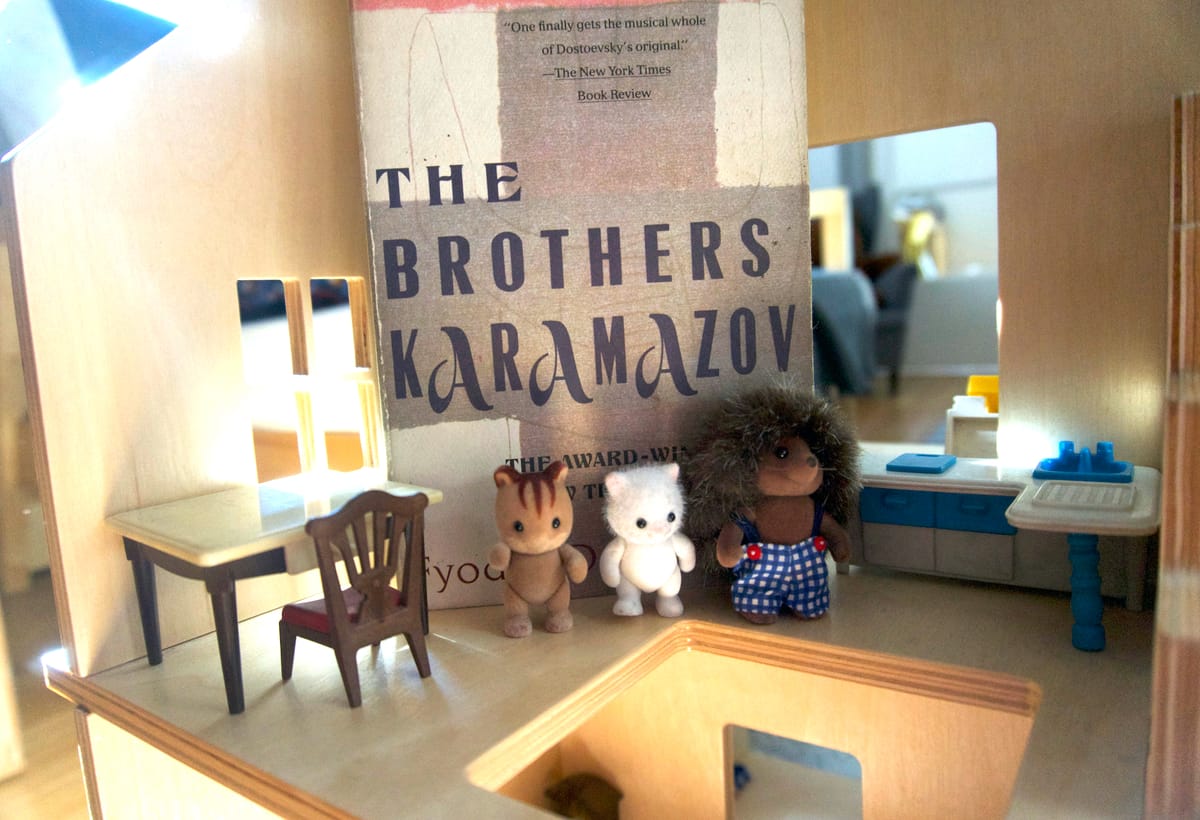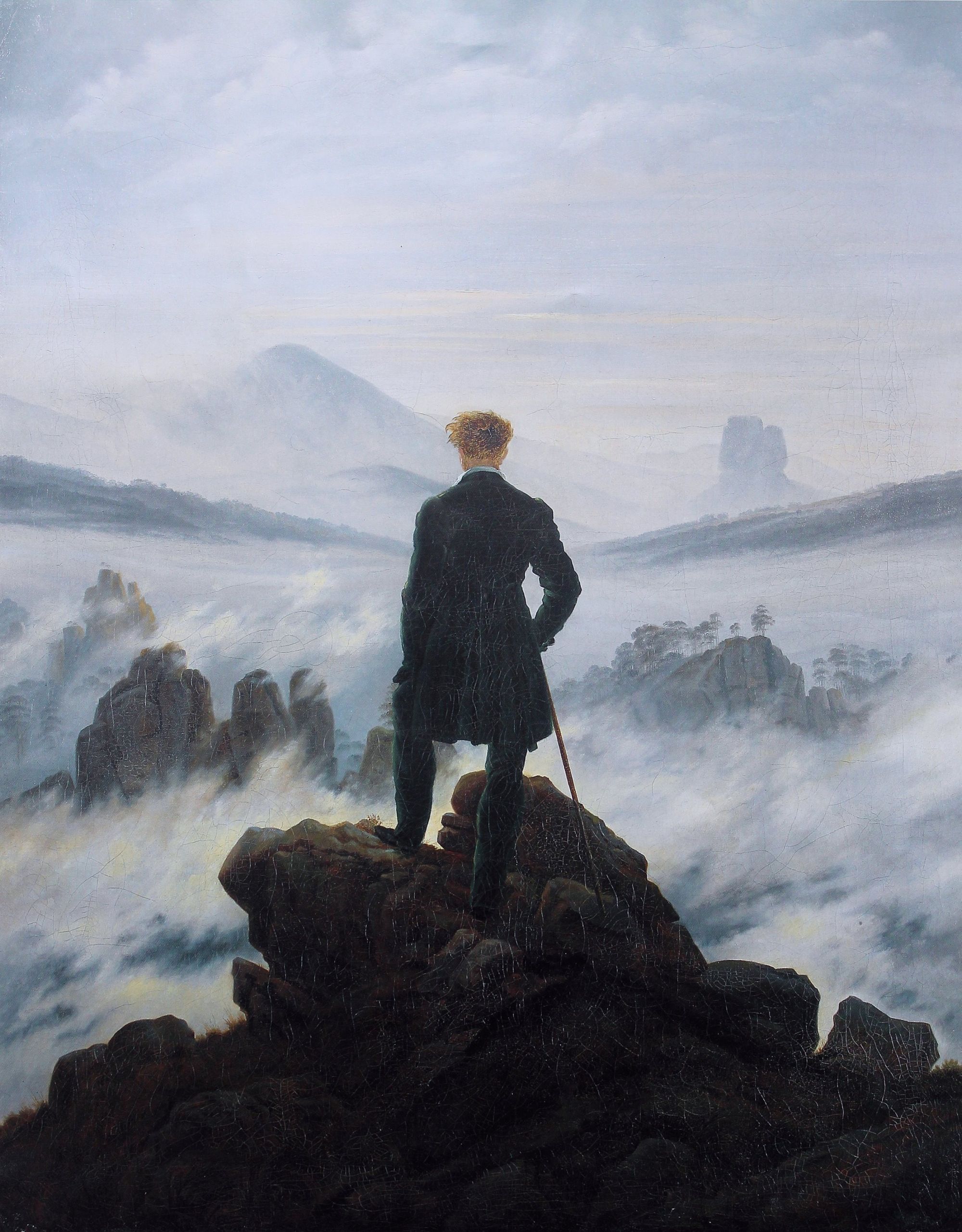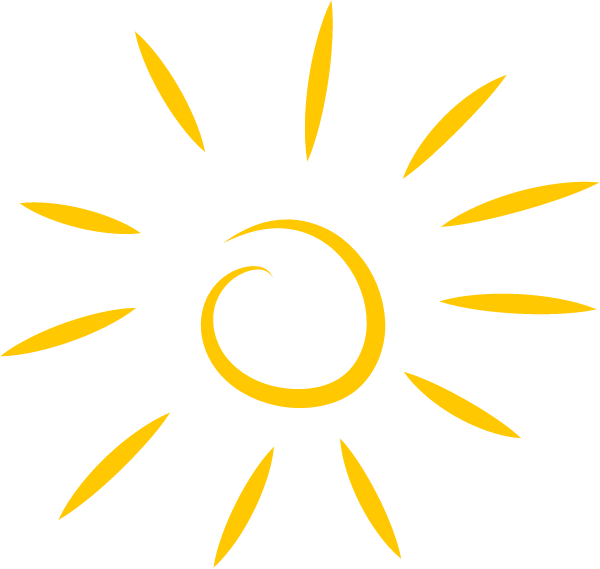The Brothers Karamazov
"I've been wondering about Dostoevsky. How can a man write so badly, so unbelievably badly, and make you feel so deeply?" (Ernest Hemingway)

Fyodor. 😢. The word "sorry" would not make much sense here, if I just wanted to apologize for not being able to find the greatest pleasure in reading your masterpiece, but for that I feel sorry only for myself. Spooked too, about my intellectual abilities, big time. I hope my parents will never find out about this.
The first time I heard about The Brothers Karamazov was from the pulpit. My father, a Lutheran pastor, interweaves literary, historical and philosophical references in his sermons. The Brothers appeared in many of his speeches. (Now, show me a book recommendation stronger than the one coming from one's father!) I wish I could recall the exact contexts in which he referenced the book. I want to remember every sentence my parents ever made and make them eternal that way. I grew up with three grandparents who were Lutheran pastors and theologians (the fourth one was an atheist Jew but that story is for another day), a father who is a pastor and a mother who is a Bibliodrama teacher. I spent quite some time in quite a few churches. Few could teach about Faith and our relationship to it the way my father does. Fyodor Dostoevsky is one.
What I do remember is that each time my father would talk about the "unavoidable, powerful and touching" works of Dostoevsky, "the most important prose ever written besides the Bible", I would take a mental note:
"Someday I must read The Brothers Karamazov."
So when I found out that The Brothers was among Hemingway's favorites that I had vowed to read, I was thrilled to get to it right away. In my teenage years I read Dostoevsky's Crime and Punishment and loved it! When I picked up The Brothers, well, many months ago (! - it took me three months to read it), I couldn't have been more positively biased towards it.
The Brothers Karamazov is a saint cow in the literary world, a godly creature, the most perfect piece of literary art, the top of high literature. The crown of the crown.
It is the story of three brothers, much like a fairy tale: Once upon a time there was a Father who didn't care about anyone on earth but himself. Dostoevsky gave him his own first name: Fyodor. If Fyodor was a hero of one of Homer's epic poems, his epithet (the one single adjective which always stands next to his name to describe him) would be: "the buffoon."
This Father has three legitimate sons from two wives: the oldest, Mitya, a simple man with a strong heart living for all great passions in life, not unlike his father. The middle one, Ivan, a reserved young man living exclusively for Philosophy, for his thoughts about faith, religion and the growing absence of G-d. The youngest is the beloved, deeply religious little brother, Alyosha, with great empathy for others. Not accidentally his epithet is "the angel".
The journey of these three is not exactly about getting beautiful princesses and their kingdoms, as the kingdom (= wealth) belongs to their Father who desires the same "princess" his oldest son is crazy about. There is another princess, this one with some money, who is loved by the second son but who is in love with the oldest brother. As in all good fairy tales it is the youngest son who could have all the "princesses" appearing in the story. Yet, he always has more urgent business to take care of than spending much time with women. He lives for G-d, his brothers, even for his evil Father. The illegitimate child of the Father, Smerdakov, also has a crucial role in the murder mystery that unfolds. The true journey of the brothers is about taking a stand in relation to their selfish Father, to each other and finally to G-d.
I'll tell you this: The Brothers Karamazov is not the kind of book that someone who admires the art of literature would ever put down. Why?
1. It has all the ingredients of a perfect story:
Its language is engaging, its story is intriguing (there is as much thrilling mystery in it as there is humor, romance and wit), and its characters are human.
Here is Ernest Hemingway to disagree somehow:
"I've been wondering about Dostoevsky. How can a man write so badly, so unbelievably badly, and make you feel so deeply?"
(Hemingway, A Moveable Feast)
Everything is present for a great novel. There is one more element, however, being present and, for this reader, overwhelming: it is the Creator himself - Fyodor Dostoevsky. He is a powerful Creator who comes at the worst times (stopping the story like an advertisement -- truly bad simile but the effect on the reader is similar), because the story is not the most important brick in this work of art. The most important brick is Philosophy.
2. It's intellectually challenging:
Reading The Brothers Karamazov is like reading Agatha Christie with the words of Zsigmond Moricz (a Hungarian magician of Literature, just read him already) and the thoughts of Socrates. How amazing is that?
Dostoevsky had the most fun with the philosophical parts. When we reach such a part everything else goes dark -- the context in which those thoughts are born, the action that preceded it, even the scene or the characters, who think and feel those monstrous size beliefs and ideologies don't truly matter anymore.
Here is a note I took while reading the book:
"I am having a hard time with the philosophical passages, the passages about religion. I found them boring and unrelated to the story. What is wrong with me?"
I am a child-like reader, probably that is it. I need the story to be the most important element of a novel, and the philosophy to be the mortar that keeps the story bricks together. Not the other way round. My reader heart feels that for the storyteller of The Brothers, it is more important to engage my brain than my heart. Way more important.
At the end of the day this novel is a philosophical masterpiece as opposed to a novel that enchants the heart.
3. It is "unavoidable": there is no way around it in the world of Literature
Anyone who ever wants to form an opinion or have a conversation about Literature must read The Brothers Karamazov. There is no way around it. It's like being a Christian without knowing (to some extent) the Bible. Whether the bricks of its story are made of philosophical anecdotes that could stand alone as short stories, or of thrilling action and crazy character development, it doesn't matter: this novel is one huge, unavoidable ROADBLOCK in the forest of Literature. If you want to get familiar with the forest, you'll have to climb over it.
People who love literature won't take you seriously until you have a decent understanding of The Brothers.
“Isn’t it true that one of the most unforgettable scenes in world literature is when Smerdyakov falls down the steps? Besides, we never find out if it’s true or not, or if it was a real attack or just make-believe. It’s unforgettable.”
(Gabriel Garcia Marquez for El Manifiesto, 1977)
Is there such a thing as the crown jewel of Literature?
The never-ending debate about the value of lowbrow and highbrow literature has always been ridiculous to me. Even among authors the genre of the novel was looked down on up until the very end of the 18th century. Novels were popular, but writing them was considered to be the bottom of literary art, the lowest of the low, so much so that Voltaire was ashamed of his novels and claimed that he had only written them to educate the masses who would only read novels, but hoped to become immortal for his epic poems and tragedies instead. (Now try to name a play by Voltaire that you love...) And so we arrive to our days when novels are the crown of literature, yet the Nobel Prize for Literature might go to musicians and brief, emoji-filled language is trending in our written culture.
Now I don't give a damn about anyone's opinion about the quality of the work of Caspar David Friedrich, my favorite painter OR about Picasso, whose pieces I'd never hang in my living room. Fame, awards, success have little to do with how we digest a piece of art (and you know that you are the pure definition of a snob when they do). Before I could even read the word "highbrow," there was just me, a kid, one of the billions who loved great stories.

I didn't want anything else from people apart from their stories. To be honest, this hasn't changed much ever since.
So I listened and a story either worked inside of me like fire does its magic in the fireplace or it died down, in which case, as soon as I felt it getting cold, I moved on to the next one. It's just that for the first 15 years of my life I didn't bump into any story that wouldn't fascinate me.
When at the age of 15 I started to not like quite a few stories, I felt that something broke inside of me, maybe the whole of me. But I start to think that it might have taken me 15 years of constant listening to stories to get to the level where "everything" didn't work anymore. Ever since then my process of evaluating books has been dreadfully simple.
There are only three kinds of stories:
1. The stories I loved
2. The stories I put down (after giving them the obligatory benefit of the doubt of 30 pages)
3. The stories I couldn't give up on (hoping for some great catharsis on their last pages, that never came. Most recent example: Normal People by Sally Rooney 😣)
The Brothers Karamazov, for this reader, belongs to the third group.
While it couldn't be any further from Normal People, it has left me with a feeling that Joyce Carol Oates called a "bewildering sense of incompleteness".
I was hoping that its philosophy about the presence or absence of G-d would make total sense at the end of the story, that it would guide the characters to take certain actions. I wanted to see how the story of Mitya, the oldest brother unfolds. I wanted to see Ivan, the middle one, rejoicing with his brothers. Yet, the only storyline that has a closure is Alyosa's, the little brother's.
Then I learned that Alyosha's story was to be continued in a sequel.
The Brothers Karamazov, however, is not about its ending.
"The bewildering sense of incompleteness one feels after having read the novel is perhaps explained by the fact of the novel's being written with a double of itself contained in its most brilliant pages, a kind of shadow or anti-novel whose tragedy mocks the positive accomplishments of the larger, Christian work."
(The Double Vision of The Brothers Karamazov by Joyce Carol Oates, 1968)
The ending doesn't matter. The journey does. Which is also to say that Dostoevsky recreated life in a way that I've never experienced in written art. Most artists exaggerate reality and create catharsis that not only tells us something true about life but at the same time also offers some consolation that makes it bearable... Not Dostoevsky. He creates art by showing exactly how life is.
Milan Kundera, one of my favorite writers, who happens to be a Czheck (a soulmate for a Hungarian) disagrees with me:
“What irritated me about Dostoyevsky was the climate of his novels: a universe where everything turns into feeling; in other words, where feelings are promoted to the rank of value and of truth.”
(An Introduction to a Variation, 1985)
My universe, as f🌬ed up as it is, is that of Dostoevsky’s.
"(...) the scientific and philosophical refutation of the existence of God has been given up, it no longer occupies at all socialists to-day (as it occupied them throughout the whole of the last century, and the first half of the present one); instead, men are denying with all their might and main the divine creation, the world of God and its meaning. These are the only things which modern civilization finds utter nonsense. I flatter myself with the hope that even in such an abstract theme I have not betrayed realism. (The refutation of this, not a direct, not a face to face refutation) will appear in the last word of the dying old monk. Many critics have reproached me because I generally choose for my novels themes that are not right, are not real and so on. I, on the contrary, know nothing more real than just these themes..."
(Letter to Konstantin Petrovich Pobedonostsev, May, 1879)
The Brothers Karamazov is a hard read. It is a hard read because Dostoevsky is certainly intellectually above me. It is a hard read because the story is halted for long periods of time by hardcore philosophy. But most of all it is a hard read because it is one of the most realistic pieces of literary art.
Reading The Brothers Karamazov is the intellectual equivalent of running the marathon. There will be walls. If you get through them, your reward will last for a lifetime: you will no longer enjoy trendy, empty, little stories.
As for me, I'll go and find my father's words about faith and Dostoevsky's masterpiece in the recordings of his sermons.
Summary:
-
Will I ever reread this book?
I will.
3/3 -
How quickly I got sucked into it?
I cannot say I ever got fully sucked into it.
1/3 -
How easy is it to read (grammar, style, highbrow/lowbrow)?
I mean, it's Dostoevsky from the 19th century, not a J.R.R. Martin book, but certainly an easier read than a Joseph Conrad or a Peter Nadas book.
1/3 -
Difficult to put it down?
No, it's not.
0/3 -
Did I cry?
Yes.
3/3 -
Did I laugh?
Yes!
3/3 -
How timeless?
I start to feel that I must eliminate this question when scoring the best of the bests. Classic by definition means timeless. Da...
3/3 -
Catharsis?
No luck.
0/3 -
Is it worth living without reading this story?
No, no. forgodssake.
3/3
17/27 =
- Read this book, if you need a true intellectual challenge.
- Read this book.
- Read Silja before The Brothers. It leaves your soul warmer.
Comparing novels is idiotic (only ranking good books on the same 1-5 star rating scale is more idiotic): there is no right order for good books, but in the urge of expressing my feelings for the books participating in the Hemingway-challenge and beyond, I make suggestions which one to read first.
P.S. I am NOT an Amazon Associate therefore I DON'T receive even a tiny commission if you make a purchase when clicking through any of my links. But if one day I changed this message, I'll still make sure to add all the links where you can find the book for FREE:
-
The Brothers Karamazov is on Planet Ebook! My favorite website for free ebooks. You can transport them to your Kindle!
Also:
-
In the thirties, an American painter Alice Neel, whose name I've just learned but will never forget, made a series of illustrations for The Brothers Karamazov for an edition that was never published. Check them out, if you have a minute! She could have been to Dostoevsky what Axel Scheffler is to Julia Donaldson. Alice Neel paints with the same darkness and same sense of humor as Dostoevsky did. Maybe one day someone can get that edition out or else we'll all stay idiots as usual, sitting on a pot of gold keeping it to ourselves.
-
If you are a reader who reads with his heart as opposed to his head, or just someone who doesn't like The Brothers, pick up any book of Frans Eemil Sillanpää translated to your language, but above of all: Silja.
